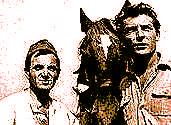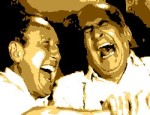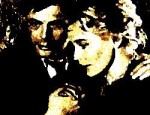Film Review
Former lawyer and journalist, André Cayatte began directing films
in 1942, much of his output epitomising what came to be known as the
quality tradition of French cinema. From 1950 until 1974, he directed films whose main themes
were justice-related (
Justice est faite,
Nous sommes tous des assassins,
Avant le déluge,
Le Dossier noir). He will
pursue his rich filmography until 1978 with dramas and socially aware
movies (
Le Miroir à deux faces,
Mourir d'aimer,
Les
Risques du métier,
Le
Glaive et la balance,
Il n'y
a pas de fumée sans feu,
Verdict). His career was
honoured with several prizes in France, Venice and Berlin. In
1960, his 125 minute war drama
Le
Passage du Rhin won the Golden Lion at the Mostra in Venice and
came out in cinemas on the 4th November 1960 in Paris.
This black and white Franco-German Italian masterpiece has wonderful
dialogue and some first class acting, especially from Armenian-born
singer/actor Charles Aznavour. In
Tirez sur le pianiste, Aznavour
had already showed his amazing natural acting talent. George
Rivière is no less excellent in one of his best roles, a
passionate and troubled character. French actress Nicole Courcel
(who worked with Jean Gabin, Lino Ventura and many more) and the almost
unknown Cordula Trantow on the German side are both perfectly suited
for their roles. With WWII as the background, we follow the
fortunes of two French prisoners in search of freedom, but, across the
Rhine, the hard road to liberty does not always show a true face.
Because the film also speaks about war from the German side, it was
controversial and was widely condemned, especially by the Nouvelle
Vague critics. In retrospect, we now see that André
Cayatte has made a profoundly human and historical fresco. It is
time that the film is re-evaluated as part of the
director's impeccable work. This must-see film is now available
on DVD.
© Willems Henri (Brussels, Belgium) 2012
The above content is owned by frenchfilms.org and must not be copied.
Next André Cayatte film:
Jean-Marc ou La vie conjugale (1963)
Film Synopsis
Paris, 1939. War is about to be declared any day. Roger
works in a bakery and Jean is a reporter for the magazine
L'Espoir. The two men have
nothing is common other than the war which is soon to engulf their
lives. Although Jean is engaged to be married, he is determined
to fight for freedom and does not hesitate to enlist in the army.
The less idealistic Roger is soon called up to defend his
country. The two men are taken prisoner during hostilities and
meet whilst crossing the River Rhine. They quickly become
friends. By pretending to be farmers, they are sent to a German
village to work for a family. Roger accepts his situation because
he is attracted towards Helga, the daughter of the house. But
Jean has no other idea than to escape...
© James Travers
The above content is owned by frenchfilms.org and must not be copied.



